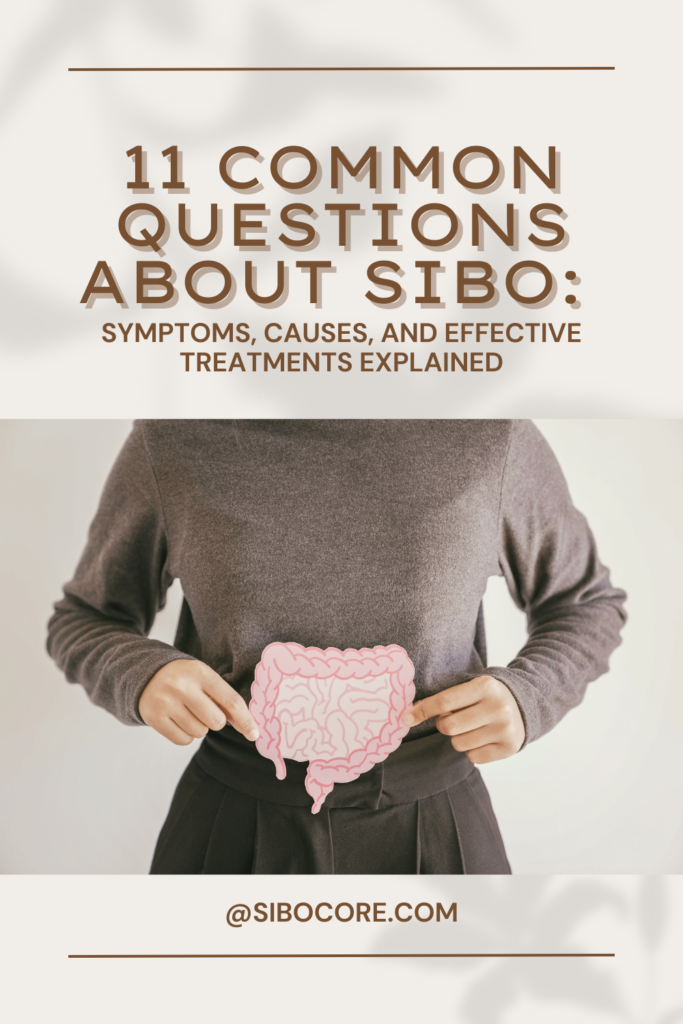Are you struggling to understand Small Intestinal Bacterial Overgrowth (SIBO)? You’re not alone! Many people are unfamiliar with this condition, but understanding it can be the first step toward relief. I’ve gathered the most common questions and about SIBO to give you straightforward answers and practical advice. These are the things I wanted to know when I first heard about SIBO. I hope they help and if there’s any other questions, please send me a message!
1. What Is SIBO? Understanding Small Intestinal Bacterial Overgrowth
SIBO stands for Small Intestinal Bacterial Overgrowth. Unlike the large intestine, which should host a range of bacteria, the small intestine usually has fewer. In SIBO, bacteria from the large intestine multiply in the small intestine, causing issues in digestion and nutrient absorption. This can lead to various symptoms that affect daily life (1).
Quick Fact: Did you know? Your digestive tract is home to trillions of bacteria that help keep your gut balanced. But when they shift to the wrong place, they can cause issues like SIBO!
2. What Are the Symptoms of SIBO?
SIBO symptoms are often confusing because they resemble those of other digestive disorders. If you’re experiencing any of the following, it might be time to talk to your doctor about SIBO:
- Bloating and excessive gas
- Abdominal pain or cramps
- Diarrhea, constipation, or both
- Floating Stools (Fat malabsorption)
- Fatigue and weakness (often due to poor nutrient absorption)
- Unexplained weight loss
- Anxiety / Depression
- Brain fog
- Food Intolerances (particularly Fructose and Lactose)
Did You Know? SIBO is often misdiagnosed as IBS or general “gut issues,” so if your symptoms aren’t improving, keep searching for answers!
3. How Is SIBO Diagnosed?
The most common diagnostic test for SIBO is a hydrogen and methane breath test. You’ll drink a solution (usually glucose or lactulose) and provide breath samples over a few hours. If your breath shows elevated levels of hydrogen or methane, it could indicate bacterial overgrowth in the small intestine. There are multiple tests for multiple types of SIBO.
Pro Tip: Ask your doctor which breath test is right for you and which preparation steps to take to get the most accurate results.
4. What Causes SIBO and Who Is at Risk?
A range of factors can lead to SIBO. Here are a few of the most common ones:
- IBS (Irritable Bowel Syndrome): IBS can slow gut motility, making bacterial overgrowth more likely.
- Surgery or structural issues: Past surgeries or small intestine abnormalities can interfere with bacterial flow.
- Low stomach acid: Low acid levels, due to aging or medications (like proton pump inhibitors), may allow bacteria to thrive.
- Chronic conditions: Conditions that affect intestinal transit, like diabetes or even long COVID, are linked to SIBO.
Quick Tip: If you have an underlying condition like IBS or diabetes, managing it may help reduce your SIBO risk.
5. Is IBS Related to SIBO? Understanding the Connection Between IBS and SIBO
No. While IBS and SIBO are separate conditions, the two often go hand-in-hand. IBS and SIBO have similar symptoms: treating SIBO can often improve IBS symptoms, suggesting an overlap in how these conditions impact the digestive system.
Try This: Tracking your symptoms and dietary habits can help both you and your doctor identify connections between IBS and SIBO, making treatment easier.
6. How Is SIBO Treated? Effective SIBO Treatments and Options Explained
Treating SIBO usually involves a mix of strategies:
- Antibiotics: Rifaximin is common, but different options may work based on whether your SIBO is hydrogen- or methane-dominant.
- Herbal antimicrobials: Natural treatments like oregano oil or berberine have shown promise in reducing bacterial overgrowth.
- Dietary changes: Low-FODMAP or SIBO-specific diets can reduce fermentable carbs that bacteria feed on and/or provide immediate relief from symptoms.
- Prokinetics: These medications help maintain gut motility, preventing future bacterial overgrowth.
Fun Fact: Many people find symptom relief through dietary changes, though complete treatment commonly involves multiple approaches.
7. Can SIBO Be Managed with Diet Alone? Best Diets for SIBO Relief

While diet alone can’t usually “cure” SIBO, dietary changes can make a huge difference. Diets like low-FODMAP and elemental diets “starve” the bacteria by limiting their food sources. Combining diet with medical treatments like antibiotics or herbal antimicrobials typically yields the best results.
8. What Are the Risks of Leaving SIBO Untreated?
If untreated, SIBO can lead to more serious health problems, such as:
- Malnutrition: Bacteria may interfere with the absorption of crucial nutrients like B12, iron, and fat-soluble vitamins.
- Leaky gut: Overgrowth can harm the small intestine lining, leading to leaky gut and immune responses.
Important Note: If you’re noticing fatigue, weakness, or frequent illness, these could be signs of nutrient deficiencies linked to untreated SIBO.
9. Can SIBO Recur After Treatment?
Unfortunately, SIBO can often recur, particularly if underlying issues like IBS aren’t addressed. Prokinetics, dietary changes, and addressing root causes like motility disorders can help prevent recurrence.
Self-Care Tip: Managing stress can support digestion and potentially reduce your risk of SIBO recurrence.
10. How Long Does It Take to Recover from SIBO?
Most SIBO treatments, whether antibiotics or herbal options, last around 2 to 4 weeks. However, long-term symptom management often requires lifestyle changes, ongoing dietary adjustments, and possibly the use of prokinetics.
11. What Should I Ask My Doctor About SIBO? Essential Questions for Your Appointment
Be prepared with questions when you visit your doctor:
- What type of SIBO do I have (hydrogen, methane, hydrogen sulfide or a mix)?
- What treatment options are best for me?
- Are there any underlying causes of my SIBO?
- Should I follow a specific diet during treatment?
- How can I prevent SIBO from recurring?
Extra Help: Having a list of questions on hand can make your appointment more productive and give you a clear path forward.
Conclusion about SIBO questions
SIBO can be challenging, but understanding its symptoms, causes, and treatments is the first step to relief. If you suspect you have SIBO, consult your doctor to create a personalized treatment plan, which may include antibiotics, herbal antimicrobials, dietary changes, and preventative strategies.
If you have more burning SIBO questions, please reach out!


